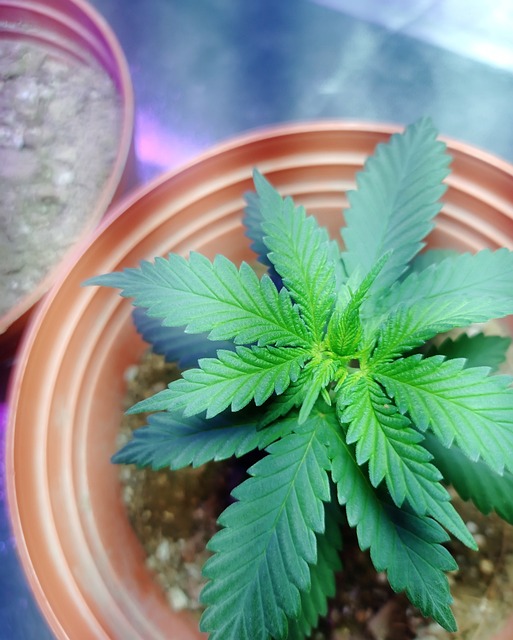THCA, or tetrahydrocannabinolic acid, is a non-psychoactive cannabinoid found in hemp and cannabis, which has garnered attention for its potential health benefits. In Kentucky, THCA's legal status is well-established under the state's hemp and medical cannabis laws, which align with federal guidelines set forth by the 2014 and 2018 Farm Bills. The state permits the sale of THCA flower provided its THC content remains below the 0.3% limit. Kentucky also allows the use of THCA products for medical purposes through its licensed dispensaries for individuals with qualifying conditions. Consumers are cautioned to stay informed about the evolving legislation and to purchase from legitimate sources, ensuring compliance with state laws that differentiate between hemp-derived and cannabis-derived THCA products. Understanding both the legal context and potential side effects is crucial for safe and responsible use of THCA in Kentucky. The state's regulated environment for hemp production and product derivatives like THCA ensures a safe market while highlighting the importance of adhering to guidelines for public health and safety.
Exploring the multifaceted nature of THCA flower, this article delves into its status within Kentucky’s legal framework and its potential side effects. As we navigate through the health implications and compare the benefits against the risks, understanding dosage and individual tolerance becomes paramount for a safe experience. Kentucky’s evolving regulations surrounding THCA provide a critical backdrop for informed decision-making in this emerging field.
- Understanding THCA Flower and Its Legal Status in Kentucky
- THCA Flower Side Effects: A Comprehensive Overview
- Potential Health Benefits of THCA Flower vs. Its Risks
- Dosage and Tolerance: Key Factors Influencing THCA Flower Experience
- Navigating the Safety and Regulatory Landscape of THCA in Kentucky
Understanding THCA Flower and Its Legal Status in Kentucky

THCA, or tetrahydrocannabinolic acid, is a non-psychoactive cannabinoid found in the Cannabis sativa plant that is the precursor to THC, the primary psychoactive component of cannabis. As research continues to uncover the potential therapeutic properties of THCA, interest in its effects has grown. In Kentucky, the legal status of THCA flower is subject to the state’s evolving hemp and medical cannabis laws. The 2014 Farm Bill paved the way for the cultivation of industrial hemp, which contains less than 0.3% THC, opening up opportunities for hemp-derived products, including THCA flower, to be legally sold and consumed if they meet this threshold. With the passage of Senate Bill 127 in 2018 and subsequent amendments, Kentucky aligned with federal guidelines, allowing for a legal hemp industry within the state. For those with qualifying conditions, Kentucky’s medical cannabis law allows for the use of products containing THCA, provided they are obtained from licensed dispensaries. It’s important for consumers in Kentucky to stay informed about the specific legislation governing THCA flower to ensure compliance with state laws. As such, understanding the nuances between hemp-derived and cannabis-derived THCA is crucial for anyone interested in its potential benefits or engaged in its legal trade within the state.
THCA Flower Side Effects: A Comprehensive Overview

Cannabidiol acid A (THCA) is a non-psychoactive cannabinoid found in the hemp plant, which has garnered attention for its potential therapeutic properties. As interest in THCA flourishes, it’s important to understand its side effects, particularly concerning its legal status in Kentucky. In Kentucky, where hemp cultivation and derivative products are legally permitted under the 2014 Farm Bill and its subsequent updates, THCA flower is increasingly available. While THCA itself does not produce psychoactive effects like its counterpart THC, it’s not entirely without potential side effects. Consumers may experience mild side effects such as dry mouth, lowered blood pressure, and reduced appetite. These effects are typically minor and temporary when THCA is used responsibly. However, individuals with pre-existing health conditions should consult healthcare professionals before incorporating THCA into their wellness routine, as it can interact with certain medications or exacerbate specific medical issues. The legal status of THCA in Kentucky ensures that consumers have access to products derived from hemp, which contains less than 0.3% THC, the psychoactive compound. This legislative clarity allows for a safe and regulated market for THCA flowers and other related products, emphasizing the importance of understanding both the legal landscape and the potential side effects for informed use.
Potential Health Benefits of THCA Flower vs. Its Risks

THCA, or tetrahydrocannabinolic acid, is a non-psychoactive compound found in hemp and cannabis plants that is gaining attention for its potential health benefits. When exposed to heat, THCA converts into THC, the psychoactive component often associated with cannabis use. As of the knowledge cutoff in 2023, THCA flower is legally accessible in Kentucky under certain conditions, as per the 2018 Farm Bill and state regulations that allow for hemp-derived products with less than 0.3% THC.
Proponents of THCA suggest it may offer a range of therapeutic effects without the psychoactive impact of THC. Studies indicate that THCA could possess anti-inflammatory, neuroprotective, and analgesic properties, which might be beneficial for conditions like arthritis, multiple sclerosis, and neuropathic pain. Preliminary research also suggests that THCA may have antiemetic effects, potentially aiding individuals undergoing chemotherapy who experience nausea and vomiting. However, human clinical trials are necessary to substantiate these benefits fully, and consumers should approach such claims with caution.
On the other hand, the consumption of THCA flower, like any substance, comes with potential risks. Although non-psychoactive, it is not without its effects on the body. Some individuals may experience mild side effects such as dry mouth, red eyes, or drowsiness when using THCA-rich products. Moreover, the long-term effects of THCA are still under investigation, and there is a lack of comprehensive research on its safety profile over extended periods of use. Additionally, because THCA flower is derived from cannabis plants, it can still test positive on drug tests designed to detect THC metabolites. Users in sensitive positions or those subject to drug testing should be aware of this possibility.
In Kentucky, where THCA legal status allows for its use under certain conditions, consumers are encouraged to procure these products from reputable sources. It is crucial to follow dosing guidelines and consult with healthcare professionals before integrating THCA flower into one’s health regimen, especially given the limited research on its long-term effects. As with any supplement or medication, individual responses can vary, and what may be beneficial for one person might not have the same effect on another.
Dosage and Tolerance: Key Factors Influencing THCA Flower Experience

The experience of using THCA flower, a non-psychoactive cannabinoid found in hemp and cannabis plants, can be significantly influenced by dosage and individual tolerance. THCA legal status in Kentucky allows consumers to explore its potential benefits, but it is imperative to approach its use with caution and understanding. Dosage plays a critical role in determining the effects of THCA; as such, users should start with a low dose to gauge their sensitivity before considering an increase. The body’s unique biochemistry and endocannabinoid system can metabolize THCA differently, leading to varied responses among individuals. Factors like weight, metabolism, and previous experiences with cannabinoids can all affect how THCA interacts with one’s system. It is advisable to consult with a healthcare professional or follow product-specific dosing guidelines when integrating THCA flower into one’s wellness routine, especially considering its legal standing in Kentucky. By adhering to recommended dosages and being attuned to personal tolerance levels, users can optimize their experience with this promising cannabinoid while minimizing the risk of side effects.
Navigating the Safety and Regulatory Landscape of THCA in Kentucky

Navigating the safety and regulatory landscape of THCA, or tetrahydrocannabinolic acid, in Kentucky requires a comprehensive understanding of both state and federal laws. As of the latest updates, THCA is legally distinct from its psychoactive counterpart, Delta-9-THC, and is found in hemp products. Kentucky’s agricultural sector has embraced hemp cultivation under the 2014 Farm Bill, which initially legalized industrial hemp research programs. The 2018 Farm Bill further clarified the federal stance, allowing for broader hemp cultivation and commerce, provided these activities are compliant with state and federal guidelines. In Kentucky, the Department of Agriculture plays a pivotal role in overseeing hemp production and ensuring that THCA products remain within legal limits of THC content. Users looking to explore THCA legal in Kentucky must be cognizant of the 0.3% THC concentration cap, which distinguishes legal hemp from marijuana under both state and federal laws. It’s imperative for consumers and businesses alike to adhere to these regulations to avoid legal implications. The regulatory framework is designed to protect public health and safety while accommodating the growing market for hemp-derived products, including those containing THCA, in Kentucky.
In Kentucky, where the legal landscape for THCA flower continues to evolve, it’s clear that understanding its potential effects and benefits is crucial for individuals considering its use. This article has demystified the side effects associated with THCA flower, highlighting their nature and how they can vary among users. The comprehensive overview of health implications underscores the importance of dosage and personal tolerance when engaging with this compound. As THCA legal status in Kentucky becomes more defined, it is imperative for consumers to approach its use with informed discretion, considering both the purported benefits and the possible risks. Users are encouraged to consult healthcare professionals and adhere to state regulations to ensure a safe experience. With ongoing research and legislative updates, the future of THCA in Kentucky remains dynamic, reflecting a commitment to public health and safety within the ever-expanding realm of cannabinoid research.
